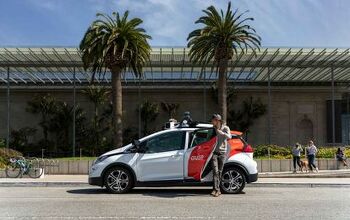Detroit: Japan's Cash-For-Clunker Program Unfair
To qualify for Japan’s cash-for-clunker program, new vehicles must meet the 2010 fuel economy standard of 35.5 mpg, making 87 percent of Japanese-made vehicles on sale in their home market eligible for the credit of up to $2,800. In fact, the Japanese program doesn’t even require a clunker (MY 1996 or older) to trade in, although without giving up an inefficient vehicle, the best credit available is a mere $1,132. But the American Automotive Policy Council calls these rules “unfair,” telling the Freep:
We urge the U.S. government to make clear that it cannot tolerate this outright discrimination, particularly at a time when it has provided substantial direct financial support for Japanese automakers in this market
Huh? Is the AAPC talking about America’s cash-for-clunker program, which (like Japan’s) sent Honda and Toyota sales soaring? Or the $1.6b DOE “ATVML” loans that Nissan got, which were dwarfed by the same program’s generosity towards Ford? Or perhaps the $82b+ TARP bailout that… oh wait, that all went to Detroit. Ok, let’s forget about America’s “substantial direct financial support for Japanese automakers” for a second and figure out just how unfair this Japanese program is.
The problem, in a nutshell, is that American automakers have sold a combined 7,901 vehicles in Japan this year. Because those numbers are so low, the Detroit firms are allowed to import vehicles under a program where their fuel efficiency does not have to be rated by the Japanese government. Because it doesn’t have official efficiency data on the low-volume models that use this program, the Japanese government has made them ineligible for the program. If we’re not mistaken though, this importation program isn’t mandated by the Japanese government, but automakers choose to use it anyway. Presumably, if Detroit had any models that could really compete in a 35.5 mpg market, they’d import them through normal channels. But with fewer than 8k units sold YTD, the Japanese market can’t possibly worth the trouble, which explains why the shrilly irrelevant AAPC was put on the case.
More by Edward Niedermeyer
Latest Car Reviews
Read moreLatest Product Reviews
Read moreRecent Comments
- Safeblonde MSRP and dealer markup are two different things. That price is a fiction.
- Del Varner Does anyone have a means to bypass the automobile data collection?
- Kjhkjlhkjhkljh kljhjkhjklhkjh two cam sensors p0024, a cam solenoid, 2 out of pocket TSB trans flushes for the pos chevy transmission 8l45 under recall lawsuit , Tsb 18-NA-355, 2 temperature sensors and a ##ing wireing harness because the dealer after the 2nd visit said the could not find out why the odb2 port and usb ports kept blowing fuses.This 2018 truck is my last domestic vehicle, the last good domestic i had was a 1969 straight 6 chevy nova with a Offenhauserintake and a 4 barrel. Only buying toyota going forward.
- 3-On-The-Tree I have a 2009 C6 Corvette LS3 and the only major repair that I have done on it was replace the radiator. Besides usual plugs, wires oil etc. And yes those tires are expensive as well.
- 28-Cars-Later We had a red 2003 with less than 100 miles in late 2004/5ish and kept it till the end AFAIK. I do recall being told we had about $28,000 in at the time (about $43,6 in 2023 Clown World Bux). I don't ever recall anyone retail even looking at it, and it lived in the showroom/garage."It's an automatic that just had the linkage repaired and upgraded"This really doesn't bode well. Maybe there's a upgrade I'm simply not aware of so one could tune the 3rd Gen LM4 for higher power but messing with it isn't making me smile because now I know its no longer factory or somehow it broke and with such low miles I'm equally concerned.

































Comments
Join the conversation
Hummer H1, for the " yes, i'm an asshole" look PS. went on holiday to Japan this fall. Outside of the Japanse names there were plenty of Volvo's, Peugeot and VW (and obvious Audi, bmw and Mercedes) and in total 3 Ford's(trucks) and 2 Hummer's. Anecdotal that would leek to a 40% marketshare for Hummer. so i can understand why the American car companies find it "unfair"
Good reporting. Finally someone to cut thru the media hype. I'd like to add another thing too. You can't sell any car in any country IF THE STEERING WHEEL IS LOCATED AT THE WRONG SIDE!!! European makes do excellently well in Japan because they send what they sell in the UK to Japan. They also adjust cars to pass Japanese safety and emissions regulations too. Did the US Big3 do so? No. Sure, they were'nt offered an open car market by the Japanese up until the 1980s, but no developing country in the early 1980s offered free open car markets anyway. Wait till you hear about the import tariffs for cars that Russia and China have even now. Talking about tariffs, import tariffs for cars/trucks (I'm going to skip details and give the general idea) are as follows. Japan: car 0%, truck 0% EU: car 10%, commercial vehicle/trucks 25% US: car 2.5%, truck 25% That's why we don't see Toyota trucks made in Thailand (Hilux and Kijang) nor the various EU commercial vans in the US. We gotta be careful when we tell who's keeping the markets open these days. But the most hilarious thing is how the Japanese Ministry for Transportation quickly made an exception to allow US "grey import" cars to be awarded their cash for clunkers program. Weak. Very Weak. Their spineless action (or willingness to favor the US) may be something we should utilize more often.